
USA – Eli Lilly’s third-quarter financial results has revealed a significant miss on profit and revenue expectations, largely driven by underwhelming sales of its prominent weight loss medication, Zepbound, and diabetes treatment, Mounjaro.
The disappointing performance has prompted the company to revise its full-year profit outlook downward.
On Wednesday, Eli Lilly’s stock dropped over 6% following the announcement of its third-quarter earnings.
The company now projects adjusted earnings for the year to fall between US $13.02 and US $13.52 per share, a substantial decrease from its prior guidance of US $16.10 to US $16.60.
This adjustment is attributed in part to a US $2.8 billion charge related to the recent acquisition of Morphic Holding, which specializes in treatments for bowel diseases.
Additionally, Eli Lilly has lowered its revenue forecast for the year, now anticipating total sales between US $45.4 billion and US $46 billion, compared to the earlier estimate that reached as high as US $46.6 billion.
Sales performance below expectations
For the quarter ending September 30, Eli Lilly reported earnings per share of US $1.18, which fell short of analysts’ expectations of US $1.47. Revenue came in at US $11.44 billion, again missing the anticipated US $12.11 billion.
Despite being on the market for nearly a year, Zepbound generated US $1.26 billion in sales during the quarter, significantly below the expected US $1.76 billion.
Mounjaro, while achieving US $3.11 billion in sales—more than double its revenue from the same quarter last year—also failed to meet expectations of US $3.77 billion.
CEO comments on market dynamics
In a recent interview with CNBC, Eli Lilly CEO David Ricks stated that the sales decline for Zepbound and Mounjaro “is not a function of supply.”
He noted that the third-quarter sales were negatively impacted by reduced inventory levels among wholesalers.
“We did have a lot of inventory going into the quarter. We had a lot less going out in the channel,” Ricks explained, asserting that underlying demand for both drugs remains robust.
Demand outstrips supply
The demand for Eli Lilly’s incretin drugs, including Zepbound and Mounjaro, has surged over the past year, leading both Eli Lilly and rival Novo Nordisk to invest heavily in expanding their manufacturing capabilities.
Despite recent improvements, the FDA’s database still indicates that immediate access to these medications may not always be available at all pharmacies.
Ricks mentioned that the company postponed promotional efforts for Zepbound due to customer service concerns, saying, “When people go and they can’t get their medicine, they’re very frustrated. We didn’t want to send more people to do that necessarily.”
These advertising initiatives are set to commence in November, aiming to bolster demand further.
Future outlook and market expansion
Looking ahead, Eli Lilly is optimistic about its production capabilities, expecting a 50% increase in incretin drug manufacturing in the second half of 2024 compared to the same period last year.
Ricks emphasized the potential for “even greater” expansions in manufacturing capacity by the end of 2025.
Furthermore, Eli Lilly recently received regulatory approval to launch its weight-loss drug in Hong Kong, expanding its global reach.
The company has also been given the green light by Chinese regulators for the sale of its weight-loss treatment, intensifying competition with Novo Nordisk in the lucrative Asian market.
XRP HEALTHCARE L.L.C | License Number: 2312867.01 | Dubai | © Copyright 2025 | All Rights Reserved